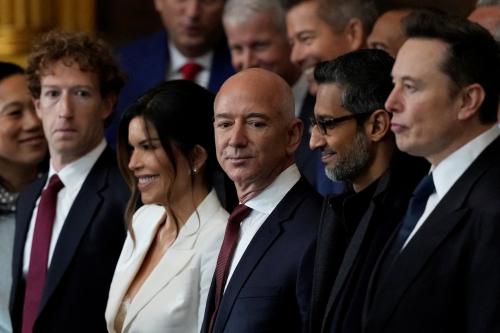We Americans are in the habit of assuming that what happens in our elections sets the tone for the entire democratic world. Sometimes that’s true, but a more realistic version of the theory holds that while trends in the United States certainly matter, they often reflect what voters in other democracies are also feeling and thinking. Yes, vibes cross borders without any tariffs.
The 1950s saw the rise of moderately conservative figures in key Western nations who were ready to come to terms with welfare state measures, which in the United States meant the New Deal. The decade’s important leaders in this mold included Dwight Eisenhower in the United States, Harold Macmillan in Britain, Charles de Gaulle in France, Konrad Adenauer in Germany, and Alcide De Gasperi in Italy.
The Reagan Era also mattered, reflecting the rise of the pro-market right or what is often called neo-liberalism. But the Reagan Era was really the Reagan-Thatcher Era; Britain’s Prime Minister Margaret Thatcher’s election predated the Gipper’s. The Reagan-Thatcher embrace of lower taxes and lighter regulation not only influenced conservative parties around the world but also led to a rethinking on the center-left.
This produced the next great trend in the world’s democracies, often referred to as the Third Way. Bill Clinton’s election in 1992 created a centrist wave on the moderate left, with Britain’s Tony Blair rising to power in 1997 after closely studying Clinton’s two successful presidential campaigns. Other Third Way leaders included Wim Kok in the Netherlands, Gerhard Schroeder in Germany, and Ingvar Carlsson and later Goran Persson in Sweden.
Donald Trump’s 2016 election and especially his 2024 return to power have sparked hope among his supporters, particularly his globetrotting champion Steve Bannon, who has worked closely with the nationalist right in Europe, that a surge of Trump-style nationalism would sweep the democratic world.
What Bannon understood is that right-wing nationalism was gaining ground in Europe even before Trump came down that escalator in 2015. There’s a case that Trump is in fact importing European nationalist politics to the U.S. right wing. Anti-immigrant political parties began playing an important role in European politics in the 2010s, and, in some cases (Denmark and France, for example), even earlier. Hungarian Prime Minister Viktor Orban, who has become a hero and ideological guide to the American nationalist right, has been in power continuously since 2010. (He also served earlier, between 1998 and 2002.)
Trump’s 2024 victory certainly shook the globe, but elections held abroad since then do not support the idea that he is leading a new right-wing wave. The outcome of elections since his victory points at least as much to a backlash against Trump and Trumpism (and especially his tariffs) than to emulation. Yet the nationalist right remains a strong force in many democratic nations, a reality brought home dramatically on June 1 by the victory of Trump-backed Karol Nawrocki in Poland’s presidential election. The runoff between Nawrocki and Warsaw Mayor Rafal Trzaskowski was a clear choice between right-wing nationalism and the liberal internationalism of the European Union. Nationalism prevailed by the narrowest of margins in a deeply divided Poland: 50.9% for Nawrocki, 49.1% for Trzaskowski.
Far-right parties also notched some important gains this year, particularly in Germany, Britain, and Portugal. In none of these cases did the far right come to power, and even in Poland, the presidency’s influence is limited compared with the legislative branch of government and the prime ministership, which are still in the hands of a broadly centrist and liberal coalition. However, the Polish result broke an anti-Trump streak in key elections and pointed to a democratic world still very much up for grabs.
The anti-Trump backlash and the failure of the far right: The cases of Canada, Australia, and Romania
The most decisive results—in Canada and Australia—represented a rebuke of Trump’s politics. In both cases, anti-Trump feelings played a clear role in strengthening centrist, liberal, and center-left forces and weakening the right. In Romania, an overtly pro-Trump nationalist candidate, who had been favored going into the election, lost decisively. It was a result that mattered to the future of Ukraine and the health of the European Union and NATO.
The turnaround in Canadian politics was especially dramatic, and the result of its election is more closely related to anti-Trump feelings than any other recent contest. The change in the fortunes of Canada’s Liberal Party was astonishing. At the beginning of the year, Canada’s Conservative Party, under its leader Pierre Poilievre, seemed destined for a landslide victory, thanks to liberal Prime Minister Justin Trudeau’s unpopularity. In late December, an Ipsos poll showed the Conservative Party with a 25-point lead over the Liberal Party, which was tied at 20% with the progressive New Democrats, Canada’s traditional third party.
Then two things happened: Trudeau, under pressure from his party, resigned and was replaced as party leader and prime minister by Mark Carney, the former head of both Canada’s and Britain’s central banks. Trudeau was charismatic, but the country was exhausted with him and his style of leadership. Carney brought a careful seriousness in its place and jettisoned some unpopular liberal policies. He could argue that he represented sufficient change to satisfy the country’s desire for a new style of government.
But that would not have been enough without Trump, whose repeated calls on Canada to become the 51st U.S. state and tariff threats enraged Canadians and provoked a wave of patriotism. Support for the New Democrats and, to a slightly lesser degree, the Quebec nationalist Bloc Québécois melted away to the Liberals.
Trump’s role in electing Carney was nicely summarized on the CBC’s election night broadcast by David Cochrane, one of the network’s lead political analysts. Noting that the U.S. president’s annual salary is $400,000, he said the Liberals would be happy “to book that as a campaign expense.”
Instead of losing seats in the April 28 election, the Liberals gained 17, ending with 169 in the House of Commons. The popular vote for the Liberals rose by more than 11%, to just under 44%. The New Democrats were devastated, losing all but seven of their 24 seats and nearly two-thirds of their popular vote. The Bloc Québécois surrendered 11 of their 33 seats, mostly to the Liberals.
Yet the potential for a Liberal loss without Trump’s interventions was underscored by the strength of the Conservative Party even in defeat (although Poilievre lost his own seat): the Conservatives picked up 24 seats, winning 144, and the party’s popular vote rose to 41.3%, up 7.6%. It’s likely the case that absent Trump’s provocations, the Liberals would have lost.
Trump’s impact on Australia’s election five days later was somewhat less pronounced than in Canada but still important. “The federal election cast Australia against the specter of Donald Trump,” wrote Peter Hartcher, the political and international editor of the Sydney Morning Herald. “It was a resounding victory for Australia.”
In the months before the election, Australia’s Labor Party under Prime Minister Anthony Albanese was running behind the conservative coalition led by Peter Dutton. Then came Trump’s tariffs, particularly offensive to a free-trading Australia that could not be accused of blocking American imports. Albanese chose his words carefully in responding: “This is not the act of a friend,” he said.
Albanese’s Labor prevailed for reasons other than Trump, including his disciplined campaign around economic issues (particularly health care) and mistakes by Dutton, who lost his own seat. But Dutton had hoped to run a Trump-style campaign against “wokeness” and had praised Trump as “a dealmaker” and “a big thinker.”
The result was a Labor landslide. Going into the election with the narrowest of majorities, Labor gained 17 seats and emerged with 94 in the 150-member House of Representatives. The Conservative coalition lost 15 seats, dropping to 43. Trump’s tariff threat put a premium on careful, moderate government, and Albanese, Hartcher wrote, was presented as “stable, sane and safe.” That was what Australia’s voters wanted.
The biggest surprise of the recent elections came on May 18 in Romania. Going into election day, far-right, pro-Trump candidate George Simion was the strong favorite, having run ahead of his centrist opponent Nicușor Dan in the first round of voting by a margin of 2-to-1. Simion was a critic of the European Union (he “sets Brussels’ nerves on edge,” wrote Politico) and an opponent of further aid to Ukraine. Simion made no secret of his admiration for Trump. “I believe that just as MAGA won power in the United States, so too the Make Europe Great Again movement will have a majority in European institutions,” he said, while also asserting that he was “almost perfectly aligned ideologically with the MAGA movement.”
Dan, the Mayor of Bucharest, is pro-Ukraine, pro-NATO, and pro-EU. He prevailed in part because of a significant surge in turnout (it rose to 65% from 53% in the first round) among voters leery of the far right. In the end, the election was not even close: Dan prevailed with nearly 54% of the vote, building a coalition of urban voters, women, and ethnic minorities—including, crucially, Hungarians living in Romania. They ignored (and in the case of many leaders of the Hungarian minority, resented) Orban’s backing of Simion.
Where the far right is on the move: The cases of Poland, Portugal, Britain, and Germany
Coming on the heels of the outcome in Romania, the Polish outcome mattered not only because it broke the anti-Trump trend, but also because Trump and his allies intervened heavily in the election. Trump gave his blessing to Nawrocki by receiving him in the Oval Office and giving him a thumbs-up, producing an all-smiles photo. Trump has yet to invite Poland’s centrist and pro-EU Prime Minister Donald Tusk to the White House.
Lest there be any doubt where the administration stood, the pro-Trump Conservative Political Action Conference held its first meeting ever in Poland, and on the Tuesday before the election, it heard from Homeland Security Secretary Kristi Noem. She explicitly urged Poland’s voters to back Nawrocki and described his foe Trzaskowski as “an absolute train wreck of a leader.” It was a remarkably direct intervention by an American official in another nation’s election, and a sign that nationalist politics is now international. Hungary’s foreign minister, Péter Szijjártó, brought this home after the election on his Facebook page, where he called Nawrocki’s triumph a “fresh victory for patriots.”
The election was a blow to Tusk, who has expanded Poland’s influence in the EU. In 2023, he and his coalition ended eight years of rule by the right-wing Law and Justice party (PiS), an outcome that seemed to herald a new liberal era in Poland. But Tusk’s efforts to reduce PiS power in the Courts and in other parts of government were slowed by vetoes from outgoing president Andrzej Duda, a PiS ally, and Tusk had hoped that Trzaskowski’s election would clear the way for his agenda. Instead, he and his government confront the PiS-backed Nawrocki. Buoyed by his victory, Nawrocki is likely to be even more aggressive than Duda in challenging Tusk.
The most dramatic, although far less seismic in their effect, parliamentary elections on May 18 in Portugal led to the emergence of the right-wing, anti-immigrant Chega party (its name translates as “Enough”) as competitive for the first time with the country’s traditional governing parties—the center-right Democratic Alliance and the center-left Socialist Party. Importantly, the moderate right led by Prime Minister Luis Montenegro prevailed in the election despite questions about Montenegro’s business interests. His party won a plurality of 91 seats, a gain of 11, with 31.2% of the vote, a gain of three points.
But the shock of the May 18 election was the rise of Chega over the Socialists, a dominant force in Portuguese politics since the country’s transition to democracy in the 1970s. Even as the Socialists lost 20 seats and 5.2% of the vote, Chega rose by a comparable share of the popular vote and gained 10 seats. The upshot: Chega emerged with 60 seats, and the Socialists 58 seats in parliament. In just six years, Chega’s share of the national vote had risen from 1.3% to 22.8%.
“Chega is the real winner,” António Costa Pinto, a political scientist with the Institute of Social Sciences at the University of Lisbon told the New York Times, adding that the party had evolved from a protest movement to a contender for power in a nation whose half-century spell of right-wing authoritarian government had long led it to shun the far right.
Britain did not hold national elections this year, but local elections in England and a by-election (special election) for Parliament marked a breakthrough for the Reform Party—right-wing, anti-immigrant, and anti-European. The party’s leader, Nigel Farage, has strong ties to Trump.
In the Parliamentary by-election in Runcorn and Helsby in northwest England, Reform overturned a majority of 14,696 for Prime Minister Keir Starmer’s Labour Party to win the seat by six votes. Reform’s share rose by 20.6%, Labour’s fell by 14.2%, and the mainstream Conservative Party lost more than half its vote, dropping 8.8%.
The local election results were, if anything, even more dramatic. In contests for 1,637 local council seats, Reform won 677 seats—none of which they held before the election. The center-left third-party Liberal Democrats won 370 seats, a pickup of 163, while the Greens gained 44 seats to emerge with 79.
The pickups by all the outsider parties reflected widespread disillusionment with the traditional major parties. The elections were a catastrophe for the Conservatives, who lost two-thirds of their seats, dropping from 674 to emerge with just 319 councilors. Labour lost 187 seats to emerge with 98.
Since most of these elections took place in areas outside of Labour’s base, their seat share was not fully reflective of its national standing, and Labor retained three Mayoralities in Doncaster, North Tyneside, and the West of England. But recent national polls suggest that Reform’s showing in the relatively low turnout local elections reflected its strength nationwide, with Labour lagging and the Conservatives in danger of being replaced by Reform as Labour’s main rival. The averages in Politico Europe’s “poll of polls” as of May 19: Reform 30%, Labour 22%, Conservatives 17%, Liberal Democrats 15%, and the Greens 10%.
Where Trump is concerned, the national elections in Germany on Feb. 23 sent a complicated message. The victor was Friedrich Merz, whose Christian Democrats (CDU) gained 4.4% of the vote to emerge as the leading party with 28.5%. The elections were a rebuke to former Chancellor Olaf Scholz, whose Social Democrats (SPD) fell by 9.3% to 16.4%. It was not only the party’s worst showing since the formation of the German Federal Republic after World War II but also its lowest share in a German national election since 1887. The two main parties still won enough seats in the Bundestag to form a majority government, and the SPD helped elect Merz as Chancellor, though only on a second ballot after he failed to secure a majority on the first.
The elections were also a setback for Scholz’s coalition partners, with the Greens losing 3.1% from their 2021 vote, dropping to 11.6%, and the pro-market Free Democratic Party faring even worse, losing more than three-fifths of its vote and dropping to 4.3%, below the 5% threshold required for seats in the Bundestag.
The collapse of the Social Democrats had another effect: the far-right Alternative for Germany (AfD) became the nation’s second-largest party. It doubled its share of the vote from the 2021 election, winning 20.8%.
Another sign of disaffection with the major parties, particularly the SPD and the Greens: the left-wing Die Linke party saw its vote nearly double to 8.8%, partly because younger voters saw it as the most forceful of all the parties in opposing the AfD. The decline in support for Germany’s two once-dominant parties continued apace. In the first German election after reunification in 1990, the CDU and the SPD won a combined 77.3% of the vote. This year, they received just 44.9%.
But was there any Trump Effect? It appears not. The AfD had already risen roughly to its Election Day levels well before Trump’s election—in mid-September, it was winning 19% in Politico’s poll tracker. If anything, the meeting between Vice President J.D. Vance and AfD leadership nine days before the election may have stalled out the AfD’s rise while also allowing leaders of Germany’s center-ground parties a chance to tout their own version of nationalism against the meddling of an American administration.
In his Feb. 14 speech, Vance left no doubts about where he stood. Mainstream German political parties had long maintained a “firewall” against cooperating with a far-right party in a nation that knew too well the costs of right-wing extremism. But Vance condemned the very idea of the anti-AfD firewall. “Democracy rests on the sacred principle that the voice of the people matters,” he said. “There’s no room for firewalls. You either uphold the principle or you don’t.” Lest the mainstream parties miss his point, he rebuked them directly: “If you’re running in fear of your own voters, there is nothing America can do for you.”
The AfD’s candidate for chancellor, Alice Weidel, touted parts of Vance’s speech on X and praised it as “excellent.” Vance later met with Weidel (he did not meet with Scholz, still then the leader of the country).
And the movement of the polls was effectively zero. The AfD stood at 21% in the polling averages on the day of Vance’s speech and ended with its 20.8% share on Election Day.
Since the election, the AfD has held its own in the polls. During the messy negotiations to form a government, the party briefly tied the Christian Democrats in first place. Since then, the polls have settled back to roughly the outcome on Election Day. A Forschungsgruppe Wahlen survey released on May 23 put the CDU at 26%, the AfD at 23%, the SPD at 16%, the Greens at 12%, Die Linke at 10% and the FDP at 4%.
But if the far-right gains mattered and the broad political center found itself beleaguered, it still held in Portugal and Germany. The English elections, though suggestive of the Reform Party’s potential, were local. Starmer’s Labour government still enjoys an overwhelming Parliamentary majority and is not required to call a new election until the summer of 2029. Still, Reform threatens to overturn the old party system in Britain—a threat to Labor, but, even more directly, to the traditional center-right.
The Trump effect and the contradictions of nationalism
Whatever else might be said of Trump, he evokes strong feelings around the world. Elections held in the first half of 2025 suggest that his victory and the way he has governed since have, on balance, hurt the right-wing nationalist movement around the world more than they helped. To the extent parties of the far-right registered gains in Portugal, Britain, and Germany, their success reflected long-term internal trends and came more despite Trump than because of him.
Trump’s approval ratings in Europe and democratic countries generally are low, and even Trump’s allies in the European far right have found moments when they had no choice but to break with him, and with Vance. Farage, for example, had to distance himself from Vance after the vice president appeared to dismiss Britain as “some random country that hasn’t fought a war in 30 or 40 years.” The European far right is split on Ukraine, and those in its ranks opposed to Russia’s aggression have taken issue with Trump’s policies of accommodation with Vladimir Putin.
The president’s tariffs and his aggressive rhetoric against Europe pose a particular problem for European nationalists who feel obligated to defend their own economies against “America First” trade policies. It is the contradiction at the heart of the idea of an international alliance of nationalists. When national interests clash, nationalists by definition must look homeward.
The Polish exception paradoxically illustrates the challenges pro-Trump forces face elsewhere in Europe. Trump has long been more popular in Poland than elsewhere on the continent, and it’s doubtful that a direct intervention of the sort Trump mounted on behalf of Nawrocki would work elsewhere.
Particularly if he holds fast to higher tariffs, Trump’s policies are more likely to weaken rather than strengthen the global forces he had hoped to unleash. Nonetheless, the pressure on center-ground parties to govern successfully is immense. “Europe’s far right is hammering at the door of power,” the Financial Times editorialized on May 25, before the Polish outcome. “Moderate parties are running out of time to satisfy voters’ concerns… Plodding centrism will not do it.” A backlash to Trump may strengthen their hand in many countries. It will not be enough everywhere, or indefinitely.
The Brookings Institution is committed to quality, independence, and impact.
We are supported by a diverse array of funders. In line with our values and policies, each Brookings publication represents the sole views of its author(s).








